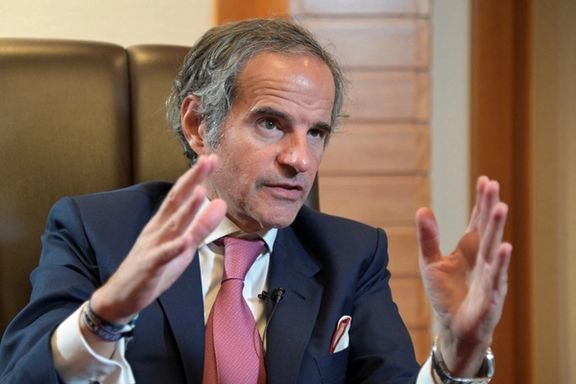IAEA Warns Of Iraq-Like Scenario For Iran Without Transparency

The UN nuclear watchdog cautions that without improved transparency on Iran's nuclear program, it cannot assure its peaceful nature, echoing fears of repercussions akin to the Iraq War.

The UN nuclear watchdog cautions that without improved transparency on Iran's nuclear program, it cannot assure its peaceful nature, echoing fears of repercussions akin to the Iraq War.
In a Friday interview with PBS, International Atomic Energy Agency (IAEA) Director General Rafael Mariano Grossi expressed concern over Iran's advancements in its nuclear program alongside restrictions placed on IAEA monitoring activities.
Grossi emphasized that without full Iranian cooperation, the agency cannot verify that its program is peaceful. The lack of visibility would be a major setback, similar to the situation during the late 1980s and 90s in Iraq.
Iraq's lack of cooperation with UN inspections fueled international isolation and ultimately led to the 2003 US-led invasion. While Iraq had pursued WMD programs from the 1960s to 1990s, it declared their destruction in the 1990s. However, concerns arose under US President George W. Bush and UK Prime Minister Tony Blair that these programs continued. The UN Security Council demanded full Iraqi cooperation with inspections, but the US viewed Iraq's actions as insufficient and cited this as justification for war. Despite President Bush's stated goals of disarming Iraq, ending Saddam Hussein's support for terrorism, and liberating its people, a later US Senate report revealed significant inaccuracies in pre-war intelligence regarding Iraqi WMDs.
Tacitly referring to the US-led invasion of Iraq, Grossi said that the world earned a harsh lesson then, and repeating it would be in no one's interest, least of all Iran. "Shutting inspectors out; telling inspectors to go away is never, never, a good idea,” he said.
In September 2023, Iran withdrew the designation of several inspectors assigned to conduct verification activities in Iran under the Non-Proliferation Treaty Safeguards Agreement. Head of the Atomic Energy Organization of Iran (AEOI), Mohammad Eslami, justified Tehran's decision by claiming that those expelled had a history of"extremist political behavior".
Grossi emphasized that the general direction of Iran’s nuclear activities is "a trend of increase of nuclear material and it has reached a very, very high level,” and that the issue is “very complex.” Beyond enrichment levels, “which is very important because that’s how nuclear weapons are made,” the key concern is the declining access for IAEA inspectors to fully monitor Iran's activities. He added that the IAEA is in Iran but "we are not inspecting at the levels and with the depth that we should be given the nature of that program.”
In February, Grossi had said that Iran is enriching at an elevated rate of around 7 kg of uranium per month to 60% purity. Enrichment to 60% brings uranium close toweapons grade and is not necessary for commercial use in nuclear power production. Iran denies seeking nuclear weapons, but no other state has enriched to that level without producing them.
Elsewhere in his Friday interview, Grossi also described the 2015 nuclear deal between Iran andworld powers as an “empty shell.” “There is no diplomacy, there is no conversation and yet again the IAEA is the only link that provides some visibility of what's happening there.”
Grossi implied that reviving the deal – officially known as the JCPOA – may not be the best plan of action now, noting that the 2015 agreement was based on specific technologies and capabilities but nearly a decade later, Iran has rapidly advanced its program. They now possess faster, more efficient centrifuges and facilities producing centrifuge parts. Additionally, Iran is developing new sites for nuclear activities.
“The spectrum of that agreement is clearly superseded at this point,” he said.“The Iran of 2015 is not the Iran of 2024.”
A report published earlier in March found that Iran continues to make progress in constructing a deeply buried nuclear site near Natanz. The report by the Institute for Science and International Security discovered that based on analysis of satellite imagery, Iran has completed construction of tunnels related to the site and is working on underground rooms that could hold enrichment halls.
The site may be invulnerable to military strikes, allowing Tehran to successfully produce weapons-grade uranium for a nuclear weapon using material diverted from other facilities, Washington-based the Foundation for Defense of Democracies (FDD) said.
“This Iranian nuclear weapons-making facility could be impervious to Israeli andperhaps even American bombs. The time is quickly running out, as Iran moves into a zone of nuclear immunity, to deny the regime permanent use of this deadly site,” said FDD CEO Mark Dubowitz.
Richard Goldberg, an FDD Senior Advisor, said, “If Tehran is allowed to complete this facility and move its enrichment infrastructure inside, we will enter a new and potentially irreversible era of the Iranian nuclear threat. Completion of this facility must be added to the list of red lines for the United States and its allies.”